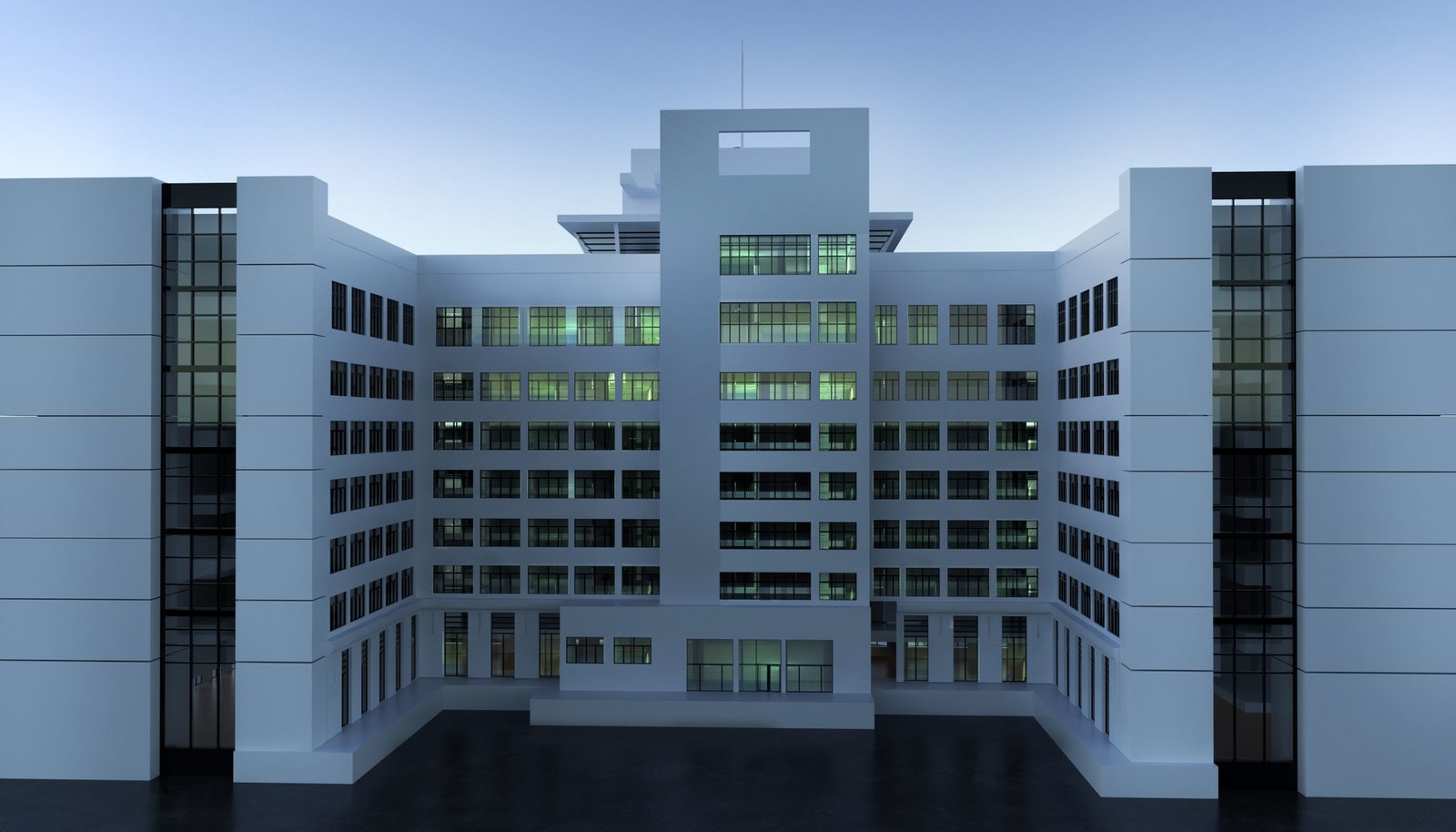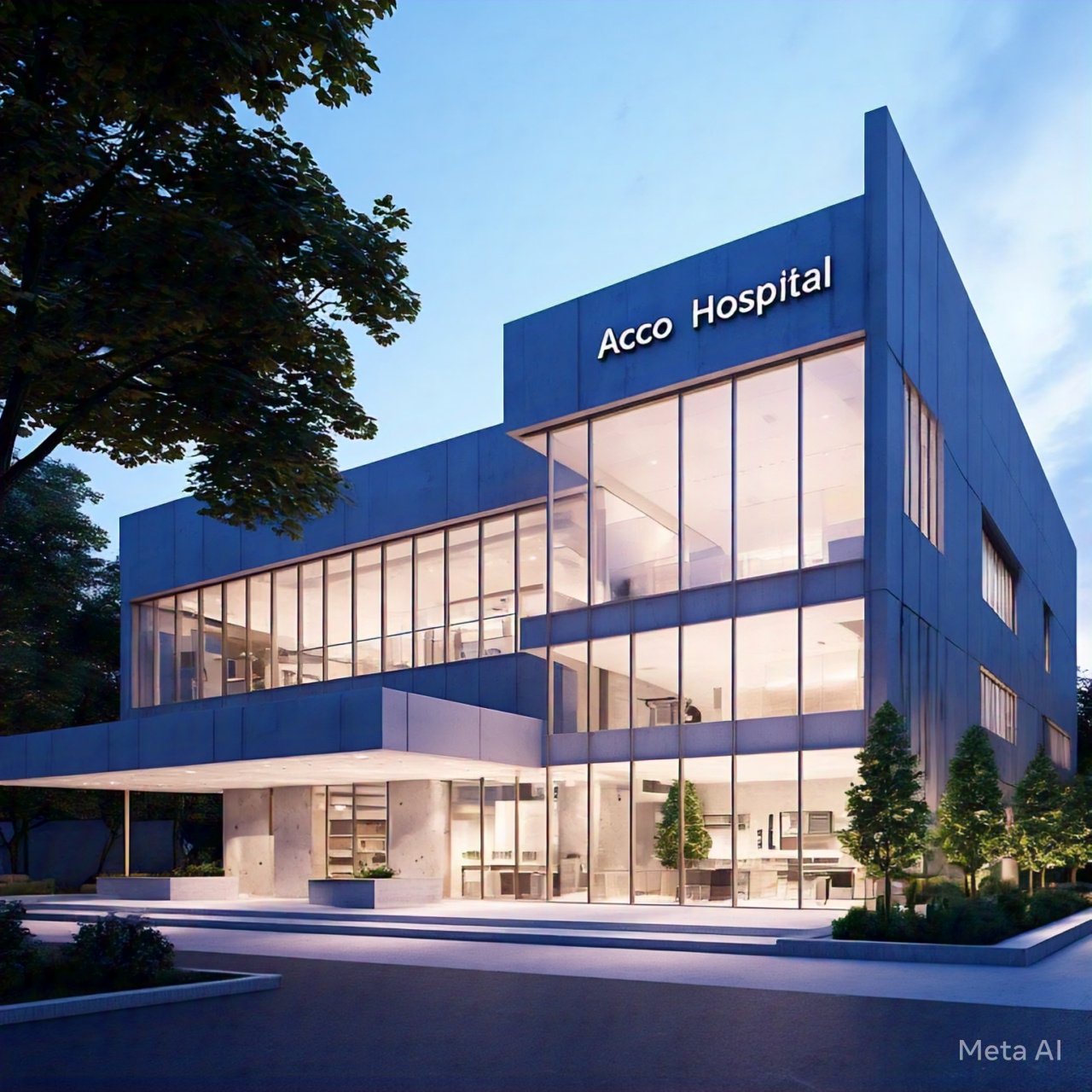
ACCO Top Innovations in Next-Generation Hospital Design in Pakistan
| Heading | Sub-headings |
|---|---|
| Introduction | – The Growing Need for Modern Hospital Design in Pakistan – ACCO’s Role in Transforming Healthcare Infrastructure |
| Key Innovations by ACCO in Hospital Design | – Smart Technology Integration in Healthcare – Sustainable Building Practices – Patient-Centric Design Philosophy |
| Smart Technology in Next-Generation Hospitals | – The Role of IoT and AI in Patient Care – Telemedicine and Remote Care Facilities – Automated Systems for Enhanced Hospital Operations |
| Sustainability as a Cornerstone of ACCO’s Designs | – Energy-Efficient Architecture – Water Conservation Strategies – Waste Management Innovations in Hospitals |
| Patient-Centric Design: Prioritizing Healing and Comfort | – Designing Healing Environments – Accessibility and Inclusivity in Hospital Spaces – The Role of Natural Elements in Patient Recovery |
| ACCO’s Impact on Healthcare in Pakistan | – Case Studies of ACCO’s Successful Projects – Challenges in Implementing Innovative Designs – The Future of Hospital Design in Pakistan |
| Conclusion | – The Lasting Influence of ACCO on Hospital Design – The Importance of Continued Innovation in Healthcare |
| FAQs | – What makes ACCO’s hospital designs stand out? – How does ACCO integrate smart technology into hospitals? – Why is sustainability important in hospital design? – How does patient-centric design improve healthcare? – What challenges does ACCO face in Pakistan? – What future trends will shape hospital design in Pakistan? |
ACCO: Top Innovations in Next-Generation Hospital Design in Pakistan
Introduction
Pakistan’s healthcare landscape is undergoing a significant transformation, driven by the need for more modern, efficient, and patient-friendly hospital environments. With the rapid advancements in medical technology and an increasing focus on sustainability, the design and construction of healthcare facilities are evolving at an unprecedented pace. At the forefront of this evolution is ACCO, a company that is leading the charge in next-generation hospital design in Pakistan. Through its innovative approaches, ACCO is setting new standards for how hospitals should be built, operated, and experienced by patients and healthcare providers alike.
As the demand for high-quality healthcare continues to rise in Pakistan, there is a growing need for hospitals that can meet the complex requirements of modern medicine while also providing a supportive and healing environment for patients. ACCO’s contributions to hospital design are helping to bridge the gap between traditional healthcare facilities and the next generation of smart, sustainable, and patient-centric hospitals. These innovations are not just improving the quality of healthcare in Pakistan; they are reshaping the future of the industry itself.
The Growing Need for Modern Hospital Design in Pakistan
The healthcare sector in Pakistan faces numerous challenges, including outdated facilities, overcrowding, and a lack of access to advanced medical technologies. These issues have highlighted the urgent need for modern hospitals that can accommodate the growing population and the increasing complexity of medical care. Traditional hospital designs, which often focus solely on functionality, are no longer sufficient to meet the demands of contemporary healthcare. There is a pressing need for facilities that are not only technologically advanced but also designed with the patient’s experience in mind.
ACCO’s Role in Transforming Healthcare Infrastructure
ACCO has emerged as a leader in addressing these challenges through its innovative approach to hospital design. The company’s vision is to create healthcare environments that are more than just places for treatment; they are spaces that promote healing, well-being, and sustainability. ACCO’s designs integrate the latest technologies, sustainable practices, and patient-centric principles to create hospitals that are equipped to meet the needs of the future. By reimagining what a hospital can be, ACCO is playing a crucial role in transforming healthcare infrastructure in Pakistan.
Key Innovations by ACCO in Hospital Design
Smart Technology Integration in Healthcare
One of the most significant innovations that ACCO has introduced in hospital design is the integration of smart technology. The use of advanced technologies such as the Internet of Things (IoT), artificial intelligence (AI), and telemedicine has revolutionized the way hospitals operate and how patients receive care. These technologies enable real-time monitoring of patients, enhance diagnostic accuracy, and streamline hospital operations, making healthcare more efficient and effective.
Sustainable Building Practices
Sustainability is at the core of ACCO’s design philosophy. The company recognizes the importance of creating healthcare facilities that are environmentally responsible and resource-efficient. ACCO incorporates sustainable building materials, energy-efficient systems, and water conservation strategies into its hospital designs. These practices not only reduce the environmental impact of hospitals but also lower operational costs, making healthcare more affordable in the long run.
Patient-Centric Design Philosophy
ACCO’s patient-centric design philosophy focuses on creating environments that support the physical and emotional well-being of patients. This involves designing spaces that are comfortable, accessible, and conducive to healing. Features such as private rooms, natural light, and soothing color schemes are incorporated into hospital designs to reduce stress and promote faster recovery. By prioritizing the needs of patients, ACCO is helping to create hospitals that are not only functional but also nurturing and supportive.
Smart Technology in Next-Generation Hospitals
The Role of IoT and AI in Patient Care
The integration of IoT and AI in hospital design has been one of ACCO’s most groundbreaking innovations. IoT devices can monitor patients’ vital signs in real-time, providing healthcare providers with continuous data that can be used to make informed decisions about patient care. AI algorithms can analyze this data to detect patterns and predict potential health issues before they become critical. This proactive approach to patient care can significantly improve outcomes and reduce the burden on healthcare providers.
Telemedicine and Remote Care Facilities
Telemedicine has become an essential component of modern healthcare, particularly in remote and underserved areas. ACCO’s hospital designs incorporate state-of-the-art telemedicine facilities, allowing patients to receive consultations and treatments from specialists without the need to travel long distances. This not only increases access to healthcare but also helps to alleviate the pressure on physical hospital spaces. By enabling remote care, ACCO is making healthcare more accessible and efficient.
Automated Systems for Enhanced Hospital Operations
Automation is another key area where ACCO is making a significant impact. Automated systems can handle a variety of tasks within a hospital, from patient admissions to inventory management. These systems reduce the workload on hospital staff, allowing them to focus more on patient care. For example, automated medication dispensers can ensure that patients receive the correct dosages at the right times, reducing the risk of errors. These innovations enhance the overall efficiency of hospital operations and contribute to better patient outcomes.
Sustainability as a Cornerstone of ACCO’s Designs
Energy-Efficient Architecture
Energy efficiency is a fundamental aspect of ACCO’s hospital designs. The company uses a variety of energy-saving technologies, such as high-performance insulation, energy-efficient windows, and solar panels, to reduce the energy consumption of its hospitals. These measures not only lower the environmental impact of the buildings but also result in significant cost savings over time. By prioritizing energy efficiency, ACCO is helping to create hospitals that are both sustainable and economically viable.
Water Conservation Strategies
Water conservation is another critical element of ACCO’s sustainable design approach. Hospitals are significant consumers of water, and ACCO has implemented several strategies to reduce water usage in its designs. These include the use of low-flow fixtures, rainwater harvesting systems, and greywater recycling. By incorporating these features into its hospital designs, ACCO is helping to conserve one of the world’s most precious resources while also reducing operational costs.
Waste Management Innovations in Hospitals
Effective waste management is essential in healthcare facilities, where large amounts of hazardous and non-hazardous waste are generated daily. ACCO has introduced innovative waste management systems that help hospitals manage their waste more efficiently and safely. This includes the segregation of waste at the source, the use of autoclaves and incinerators for the disposal of medical waste, and recycling programs for non-hazardous waste. These practices reduce the environmental impact of healthcare facilities and ensure the safety of patients and staff.
Patient-Centric Design: Prioritizing Healing and Comfort
Designing Healing Environments
ACCO’s patient-centric designs prioritize the creation of healing environments that promote relaxation and well-being. This includes the use of calming color schemes, natural light, and access to outdoor spaces. Research has shown that patients recover more quickly and experience less stress in environments that are aesthetically pleasing and comfortable. By focusing on the patient experience, ACCO’s designs help to improve health outcomes and enhance the overall quality of care.
Accessibility and Inclusivity in Hospital Spaces
Accessibility is a crucial consideration in ACCO’s hospital designs. The company ensures that all of its facilities are accessible to patients with disabilities, including those who use wheelchairs or have visual or hearing impairments. This includes the design of entrances, corridors, and patient rooms that are easy to navigate and use. By making its hospitals inclusive for all patients, ACCO is helping to create healthcare environments that are welcoming and supportive for everyone.
The Role of Natural Elements in Patient Recovery
The incorporation of natural elements into hospital design is another key innovation by ACCO. Studies have shown that exposure to nature can have a positive impact on patient recovery, reducing stress and improving mood. ACCO’s designs include features such as indoor gardens, large windows with views of nature, and the use of natural materials like wood and stone. These elements create a calming, restorative environment that supports the healing process and enhances the overall patient experience.
ACCO’s Impact on Healthcare in Pakistan
Case Studies of ACCO’s Successful Projects
ACCO’s impact on Pakistan’s healthcare sector can be seen in its numerous successful projects across the country. These projects showcase the company’s commitment to innovation, sustainability, and patient-centered design. For example, ACCO’s work on new hospitals in urban and rural areas has set new standards for healthcare facilities in Pakistan. These hospitals are equipped with the latest medical technologies, designed to be energy-efficient, and built with the patient’s comfort and well-being in mind. Through these projects, ACCO has demonstrated its ability to transform healthcare infrastructure in Pakistan.
Challenges in Implementing Innovative Designs
While ACCO has made significant strides in revolutionizing hospital design in Pakistan, the company has also faced several challenges in implementing its innovative designs. These challenges include limited resources, regulatory hurdles, and resistance to change from traditional stakeholders in the healthcare industry. Despite these obstacles, ACCO has continued to push the boundaries of what is possible in hospital design, finding creative solutions to overcome these challenges and deliver high-quality healthcare facilities.
The Future of Hospital Design in Pakistan
Looking ahead, the future of hospital design in Pakistan is bright, thanks in large part to ACCO’s contributions. As the demand for modern, efficient, and patient-friendly healthcare facilities continues to grow, ACCO is well-positioned to lead the way in meeting this demand. The company’s focus on innovation, sustainability, and patient-centered design will continue to drive its success in the years to come. Additionally, ACCO’s commitment to overcoming challenges and finding new ways to improve healthcare environments will ensure that it remains a key player in the transformation of Pakistan’s healthcare landscape.
Conclusion
The Lasting Influence of ACCO on Hospital Design
ACCO’s contributions to hospital design in Pakistan are both profound and lasting. By introducing top innovations in next-generation hospital design, ACCO is helping to shape the future of healthcare in the country. The company’s work has not only improved the quality of care that patients receive but also created healthcare environments that are conducive to healing, well-being, and sustainability. As ACCO continues to lead the way in hospital design, its influence on Pakistan’s healthcare landscape will only grow stronger.
The Importance of Continued Innovation in Healthcare
Innovation is the key to the future of healthcare, and hospital design is no exception. ACCO’s work demonstrates the importance of integrating new technologies, sustainable practices, and patient-centered design into healthcare facilities. By continuing to innovate and push the boundaries of what is possible in hospital design, ACCO is helping to create healthcare environments that are not only functional but also supportive of the healing process. The importance of this work cannot be overstated, as it has the potential to improve the lives of countless patients across Pakistan.
FAQs
What makes ACCO’s hospital designs stand out?
ACCO’s hospital designs stand out because they integrate advanced technologies, sustainable practices, and patient-centered care into every project. This holistic approach ensures that each hospital is equipped to meet the needs of both patients and healthcare providers, resulting in better health outcomes and a more efficient healthcare system.
How does ACCO integrate smart technology into hospitals?
ACCO integrates smart technology into hospitals through the use of IoT devices, AI systems, and telemedicine facilities. These technologies enable real-time patient monitoring, enhance diagnostic accuracy, and streamline hospital operations, making healthcare more efficient and effective.
Why is sustainability important in hospital design?
Sustainability is important in hospital design because it helps to reduce the environmental impact of healthcare facilities while also lowering operational costs. By using energy-efficient materials, conserving water, and implementing effective waste management systems, sustainable hospitals create healthier environments for both patients and staff.
How does patient-centric design improve healthcare?
Patient-centric design improves healthcare by creating environments that are conducive to healing and well-being. Features such as private rooms, natural light, and accessible facilities help to reduce stress and promote faster recovery, leading to better overall health outcomes for patients.
What challenges does ACCO face in Pakistan?
ACCO faces several challenges in Pakistan, including limited resources, regulatory hurdles, and the need to meet the diverse needs of a growing population. However, the company’s innovative approach and commitment to quality allow it to overcome these challenges and deliver world-class healthcare facilities.
What future trends will shape hospital design in Pakistan?
Future trends that will shape hospital design in Pakistan include the continued integration of advanced technology, a stronger focus on sustainability, and the




